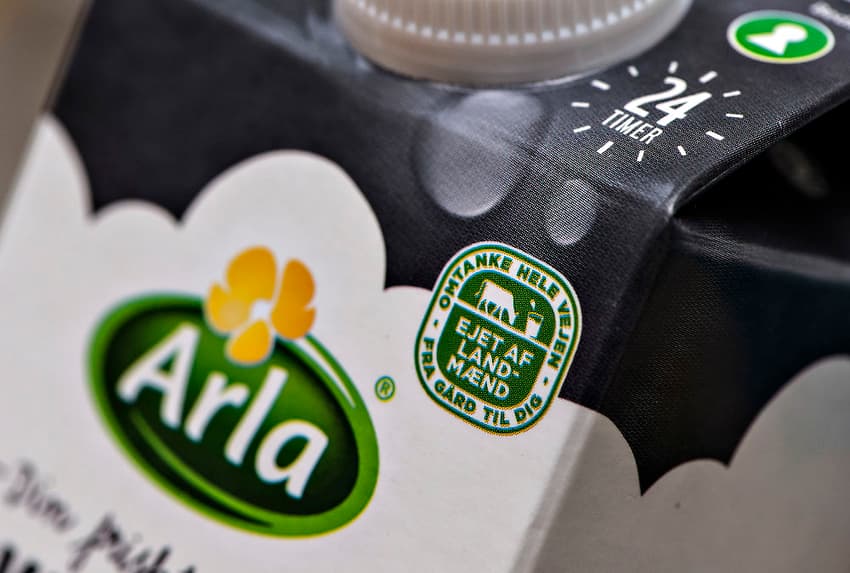Danish dairy giant preparing for no-deal Brexit

Arla, Denmark’s largest dairy company which exports to the United Kingdom on a large scale, says it is preparing to be hit by the consequences of the UK leaving the EU without an agreement on the future trade relationship between the two.
The UK imports 16 percent of its dairy products, of which 98 percent is from EU countries.
Brexit is scheduled for March 29th next year, but uncertainty remains over whether a deal on the future relationship will be reached.
Arla is therefore preparing for what would be the worst possible outcome from its perspective, according to the Danish dairy firm’s European director Peter Giørtz-Carlsen.
A no-deal Brexit would have serious consequences for Arla, Giørtz-Carlsen said.
“We are looking at no-deal Brexit being a reality,” he said.
“That would be very bad for the European dairy industry. If you break the very effective supply chain currently in place between the EU and the UK, there could be serious consequences,” the Arla head of Europe said.
“The price of dairy products in the UK will increase, the range of products will decrease, and ultimately, there will be an effect on Arla’s business. The UK is our biggest market,” he said.
British prime minister Theresa May said in the House of Commons on Monday that the two sides are “95 percent” agreed over a deal.
Arla has already lost over one billion kroner as a result of the British decision to leave the union, according to Giørtz-Carlsen.
The director was scheduled to meet Thursday with agriculture organisations from Denmark, the UK, Germany, France, Ireland and the Netherlands to discuss the consequences of Brexit.
“We believe the best scenario, if the UK does not remain in the EEA or in a customs union, would be a free trade agreement without customs barriers such as tariffs or administrative burdens,” he said.
“It is important to keep the chain of supply intact after Brexit,” he said.
The UK is scheduled to leave the EU on March 29th next year, but remain in the EU’s customs union for a transitional period until 2020.
READ ALSO: No-deal Brexit would be bad news for Danish industry: analysts
Comments
See Also
The UK imports 16 percent of its dairy products, of which 98 percent is from EU countries.
Brexit is scheduled for March 29th next year, but uncertainty remains over whether a deal on the future relationship will be reached.
Arla is therefore preparing for what would be the worst possible outcome from its perspective, according to the Danish dairy firm’s European director Peter Giørtz-Carlsen.
A no-deal Brexit would have serious consequences for Arla, Giørtz-Carlsen said.
“We are looking at no-deal Brexit being a reality,” he said.
“That would be very bad for the European dairy industry. If you break the very effective supply chain currently in place between the EU and the UK, there could be serious consequences,” the Arla head of Europe said.
“The price of dairy products in the UK will increase, the range of products will decrease, and ultimately, there will be an effect on Arla’s business. The UK is our biggest market,” he said.
British prime minister Theresa May said in the House of Commons on Monday that the two sides are “95 percent” agreed over a deal.
Arla has already lost over one billion kroner as a result of the British decision to leave the union, according to Giørtz-Carlsen.
The director was scheduled to meet Thursday with agriculture organisations from Denmark, the UK, Germany, France, Ireland and the Netherlands to discuss the consequences of Brexit.
“We believe the best scenario, if the UK does not remain in the EEA or in a customs union, would be a free trade agreement without customs barriers such as tariffs or administrative burdens,” he said.
“It is important to keep the chain of supply intact after Brexit,” he said.
The UK is scheduled to leave the EU on March 29th next year, but remain in the EU’s customs union for a transitional period until 2020.
READ ALSO: No-deal Brexit would be bad news for Danish industry: analysts
Join the conversation in our comments section below. Share your own views and experience and if you have a question or suggestion for our journalists then email us at [email protected].
Please keep comments civil, constructive and on topic – and make sure to read our terms of use before getting involved.
Please log in here to leave a comment.